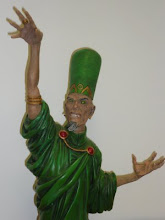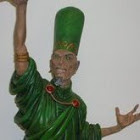 Enjoyable not entirely successful dystopian science fiction. The Snow Piercer is a train with one thousand and one carriages that travels ceaselessly around an Earth that has suffered a climate catastrophe, it is a perpetual polar winter all over the world. Proloff is a refugee from the last carriages of the train, desperate to escape the hellish conditions. He is captured by the military guards that patrol the corridors and is arrested. Adeline, a member of an aid group finds herself unexpectedly caught up with Proloff as they are both escorted up the length of the train to meet with the train's leaders. The journey, the meeting and its consequences are beautifully illustrated by Jen-Marc Rochette in vivid black and white, the story itself is too schematic and trapped by its context to really break free and take flight.
Enjoyable not entirely successful dystopian science fiction. The Snow Piercer is a train with one thousand and one carriages that travels ceaselessly around an Earth that has suffered a climate catastrophe, it is a perpetual polar winter all over the world. Proloff is a refugee from the last carriages of the train, desperate to escape the hellish conditions. He is captured by the military guards that patrol the corridors and is arrested. Adeline, a member of an aid group finds herself unexpectedly caught up with Proloff as they are both escorted up the length of the train to meet with the train's leaders. The journey, the meeting and its consequences are beautifully illustrated by Jen-Marc Rochette in vivid black and white, the story itself is too schematic and trapped by its context to really break free and take flight.Dystopion science fiction is a very difficult genre to pull off successfully, pessimism is a slippery tool to use to engage and draw in readers. When there is no possibility of relief from despair, cruelty is just baked into the process then getting a reader to invest in any character is uphill work. They can easily be just puppets with the the whole weight of the story resting on the inventiveness of the context and the lengths to which the cast will go before their inevitable defeat.
Jacques Lob has two additional significant problems, the very restrictive context for the story and the overly familiar social structure and both work together to reduce the impact of the story.
Having someone from the rear of the train being escorted to the front is a nicely creative way of moving through the train and revealing the society, it solves the problem of how someone could make the journey as a fugitive all the way. The problem is that a train is a very narrow context, everything has to be crammed together and there is no room for unexpected views or action to develop on a wider stage. Everything has to take place pretty much in sequence and in a narrow space, the very most is always made of the opportunities, there is still a sense of the action being cramped and without room for the unexpected.
This lack of expansiveness is also present in the social structure on the train, the free feasting elite at the top, the desperate and brutal underclass at the back with a somewhat naive middle carriages uneasy in their privileges in the middle. Within these restrictions the plot does its best, it still feels allegorical at all the wrong times, the plot is subservient to a purpose and lowers the tension in the story to dangerous levels.
What rescues the story is the cast, wonderfully realised by Jean-Marc Rochette and given a surprising degree of humanity by Jacques Lob, they struggle against the placards that are hung around their necks and assert themselves when and where they can. The narrowness of the context and the wholehearted hostility of the external world highlights the stubborn will to survive that gives the cast a lift out of their boxes. The balance of creativity is enough to make the book worth reading.


No comments:
Post a Comment